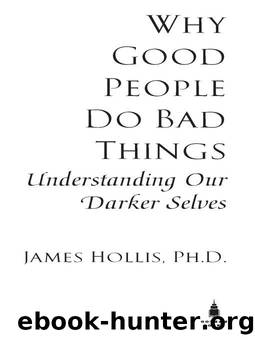Why Good People Do Bad Things by James Hollis

Author:James Hollis
Language: eng
Format: epub, azw3
Publisher: Penguin Publishing Group
Published: 2015-12-10T16:00:00+00:00
Thus, institutions can carry a very large Shadow. Those who work within its walls are often caught in tautological justifications—“we do this because this is what we do”—rather than questioning the premises of the institution. Institutions can depersonalize, crush dissenters and reformers, and roll over those whom they were founded to serve. Whether the institution is a corporation, a religious, academic, or charitable body, or a government, it has its own limited vision and always begets a Shadow agenda and a Shadow cost. How many institutions have proved so enlightened, or their leadership so visionary, as to vote themselves out of existence once their purpose has been achieved or ceased to be relevant?
No one better depicted this recurrent institutional nightmare than Franz Kafka in his novels The Trial and The Castle. By day he worked in a workman’s insurance corporation, and by night he went home to write his lonely parables of the desouling of the modern individual. “In the Penal Colony,” describes one victim upon whose back is inscribed by a vicious harrow, HONOR THY SUPERIORS. What better portrait of the fascist mentality that can so often lie at the heart of collective social agencies? When he was alive, Kafka might have seemed a fantasist, even a diseased imagination. Who could have guessed that only a few years later his three sisters, and his lover, Milena Jasenka, would be transported to Auschwitz, where they were murdered by the state, an institution whose elemental raison d’être is the protection of its citizens? In “The Metamorphosis,” he dramatizes a man who is transformed into a gigantic insect, a metaphor for radical depersonalization. How outlandish, this image! Yet shortly thereafter, his coreligionists were called Ungeziefer, or vermin, by state institutional authorities, in order to depersonalize them so that the conscience of those who grew up in Christian institutions could murder those who had become “only insects.” How anxious, uncertain must a people be to try to annihilate another people?
It is the very erosion of the old “certainties” that has given rise to fundamentalism around the world. Whether Muslim or Jewish or Christian, fundamentalism flourishes in a context of fear and uncertainty.70 Such fundamentalist camps have seen the enormous seductive drugs of affluence and secular diversions, and sincerely believe that “down that path lies the abyss.” With the erosion of their tribal mythologies, distortions and diversions quickly fill the gap. But such uncertainty does not grant one person the right to impose his or her beliefs on another, especially as such beliefs are so often fear-driven, even bigoted. At the heart of their fear lies the Shadow of violence, whether that of overt terrorism or the compulsion to dominate others and drive out dissent. It is this shadowy violence, whether they employ the “thought police” or the ones with truncheons, that brings greatest harm to others.71
One of the most elemental of all psychological observations is rather crudely expressed as, “What you sees is a compensation for what you don’t sees.” In other words,
Download
Why Good People Do Bad Things by James Hollis.azw3
This site does not store any files on its server. We only index and link to content provided by other sites. Please contact the content providers to delete copyright contents if any and email us, we'll remove relevant links or contents immediately.
Professional Troublemaker by Luvvie Ajayi Jones(29644)
Whiskey Words & a Shovel I by r.h. Sin(19387)
Rewire Your Anxious Brain by Catherine M. Pittman(18634)
Healthy Aging For Dummies by Brent Agin & Sharon Perkins RN(17033)
Cat's cradle by Kurt Vonnegut(15324)
Talking to Strangers by Malcolm Gladwell(13340)
The Art of Thinking Clearly by Rolf Dobelli(10408)
They Both Die at the End by Adam Silvera(9801)
The 5 Love Languages: The Secret to Love That Lasts by Gary Chapman(9773)
Doing It: Let's Talk About Sex... by Hannah Witton(9273)
The Compound Effect by Darren Hardy(8919)
Thirteen Reasons Why by Jay Asher(8882)
Goodbye, Things by Fumio Sasaki(8571)
Wonder by R.J. Palacio(8566)
Tools of Titans by Timothy Ferriss(8360)
Atomic Habits: Tiny Changes, Remarkable Results by James Clear(8315)
Becoming Supernatural by Dr. Joe Dispenza(8195)
Wonder by R. J. Palacio(8097)
Change Your Questions, Change Your Life by Marilee Adams(7732)
